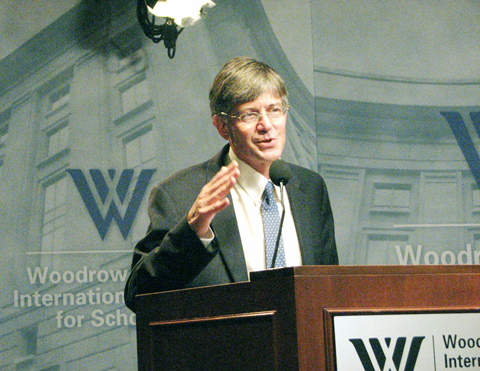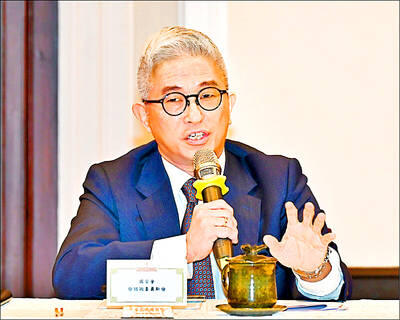US Deputy Secretary of State James Steinberg told a major conference on US-China relations that Washington retains a “very strong commitment” to Taiwan.
While acknowledging that US ties with Beijing were improving, he said: “There is a very strong commitment and appreciation for the tremendous achievements that the people of Taiwan have accomplished both in the economic and especially in the political sphere.”
Steinberg, a powerful US policymaker, was asked at the Wilson Center conference if the “passion” had gone out of US-Taiwan relations.

PHOTO: CNA
He replied: “It’s a dangerous road for me to go down, to talk about passion and diplomacy, but I would simply say that at its core, it is an unofficial relationship that we have with Taiwan.”
“We have enormous respect for the very vibrant, open, democracy that Taiwan has and so if Americans can be passionate about anything, it is continued commitment to our engagement through the Taiwan Relations Act and all of the other elements that are characterized in the unofficial relationship,” Steinberg said.
It was the strongest reassurance given by the administration of US President Barack Obama with respect to US commitments to Taiwan in some time, appearing to trump comments that came later and hinted at the possibility of the US halting arms sales to Taiwan.
Steinberg said it was crucial for the US to have close dialogue with China — particularly at the military-to-military level — so that the two countries could reassure each other “particularly in areas where there is some inherent ambiguity about the nature of our activities.”
“There are also risks as we go forward. No area is more potentially fraught with danger to the constructive, stable relationship, than the evolution of the Chinese military,” he said. “If we don’t talk to each other, the risk of miscalculation or misunderstanding will be very high.”
“And so we place enormous importance on military-to-military dialogue and a broader security dialogue. We are encouraged that we seem poised to move back in a more constructive direction to begin re-engagement on that front,” he said.
Yuan Ming (袁明), a professor at Peking University, was unable to attend the conference as planned because of an injury suffered in a recent car accident.
However, in her prepared remarks read at the conference, she said: “The special issue of arms sales to Taiwan remains a hard knot to untie.”
Yuan said that if the US failed to take steps “to loosen the knot,” it would invite sharp criticism from the Chinese people, especially the younger generation.
If something was not done about the arms sales, “the military-to-military dialogue should be quite a full dialogue,” she said.
“I am trying to perceive what Yuan Ming meant about Taiwan,” retired US Admiral Eric McVadon said. “I wonder if it might be time — with this good relationship between the presidents of the US and China — to have more candor on the Taiwan issue. Can we move to a point of agreeing to disagree, with both sides being militarily ready, but at the same time with the easing of relations that you don’t have to worry quite as much? Can we try to put the Taiwan issue behind us a little bit, or at least keep it from coming to the fore. Was Yuan Ming alluding to such a thing?”
“We do have to address the Taiwan arms question, it’s time to do that,” said Douglas Paal, vice president at the Carnegie Endowment for International Peace in Washington and a former director of the American Institute in Taiwan.
“I would infer that Yuan Ming was reflecting what we have all heard in China recently, which was that tensions are so reduced across the [Taiwan] Strait, that China has made a significant contribution in reducing those tensions, especially through the ECFA [Economic Cooperation Framework Agreement] and restraint in political dealings and agreeing to limitations that Taiwan requests, that the US ought to show similar restraint in arms sales,” Paal said.
“There are quite a few people articulating that point of view officially and unofficially in China,” he said. “I am aware of two private dialogues going on in the US about whether ... there is a way for the US to sit down and have the two presidents discuss whether there can be some mutual restraints.”
“It will be very interesting to see how these private dialogues unfold,” he said.
“My personal guess would be this is something that if it is ever going to be done it is going to be done by a hardcore Republican administration. And it won’t be done with an administration with the composition and character of the current administration,” he said.
“The people in China who think this might be the moment are probably going to be disappointed,” Paal said.
While no one spelled it out at the conference, what may be at issue is a plan under which the US would stop selling arms to Taiwan in return for some assurance that Beijing would not launch a military takeover.
However, there has been no word that such talks are seriously underway at a policy-setting level within the Obama administration and there was certainly no indication of that in Steinberg’s keynote address.
Asked later by the Taipei Times about the “private dialogues” he referred to, Paal said: “I simply know that two small groups of private individuals think there ought to be a way for the US and China to discuss means to reduce the arms buildup across the Strait, a goal a great many share.”
“They are private and I respect their privacy. How to do what they desire without running downside risks seems to be very hard to achieve,” he said.
Also See: US official says China is backing stance on N Korea

A car bomb killed a senior Russian general in southern Moscow yesterday morning, the latest high-profile army figure to be blown up in a blast that came just hours after Russian and Ukrainian delegates held separate talks in Miami on a plan to end the war. Kyiv has not commented on the incident, but Russian investigators said they were probing whether the blast was “linked” to “Ukrainian special forces.” The attack was similar to other assassinations of generals and pro-war figures that have either been claimed, or are widely believed to have been orchestrated, by Ukraine. Russian Lieutenant General Fanil Sarvarov, 56, head

SAFETY FIRST: Double the number of police were deployed at the Taipei Marathon, while other cities released plans to bolster public event safety Authorities across Taiwan have stepped up security measures ahead of Christmas and New Year events, following a knife and smoke bomb attack in Taipei on Friday that left four people dead and 11 injured. In a bid to prevent potential copycat incidents, police deployments have been expanded for large gatherings, transport hubs, and other crowded public spaces, according to official statements from police and city authorities. Taipei Mayor Chiang Wan-an (蔣萬安) said the city has “comprehensively raised security readiness” in crowded areas, increased police deployments with armed officers, and intensified patrols during weekends and nighttime hours. For large-scale events, security checkpoints and explosives

‘POLITICAL GAME’: DPP lawmakers said the motion would not meet the legislative threshold needed, and accused the KMT and the TPP of trivializing the Constitution The Legislative Yuan yesterday approved a motion to initiate impeachment proceedings against President William Lai (賴清德), saying he had undermined Taiwan’s constitutional order and democracy. The motion was approved 61-50 by lawmakers from the main opposition Chinese Nationalist Party (KMT) and the smaller Taiwan People’s Party (TPP), who together hold a legislative majority. Under the motion, a roll call vote for impeachment would be held on May 19 next year, after various hearings are held and Lai is given the chance to defend himself. The move came after Lai on Monday last week did not promulgate an amendment passed by the legislature that

PENTAGON ASSESSMENT: A US report said that even as China and Russia deepen their partnership, cooperation is hindered by a ‘mutual distrust’ of each other The Chinese People’s Liberation Army (PLA) as of October had doubled the number of ships and airplanes deployed around Taiwan compared with the previous two years, Vice Minister of National Defense Hsu Szu-chien (徐斯儉) said yesterday, a day after the opposition-controlled legislature voted against reviewing the government’s general budget for next year, including a NT$1.25 trillion (US$39.71 billion) special defense spending bill. The legislature’s vote against the Ministry of National Defense’s spending plans was regrettable, as the budget was designed to respond to the developing Chinese military threat, Hsu said on the sidelines of a legislative meeting on the general budget. Defense